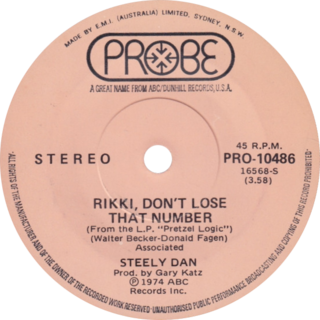Related Research Articles

Steely Dan is an American rock band formed in Annandale-on-Hudson, New York, in 1971 by Walter Becker and Donald Fagen. Originally having a full band lineup, by the end of 1974, Becker and Fagen chose to stop playing live and continue Steely Dan as a studio-only duo, utilizing a revolving cast of session musicians. Rolling Stone has called them "the perfect musical antiheroes for the seventies".

The squonk is a mythical creature that is reputed to live in the hemlock forests of northern Pennsylvania in the United States.

Pretzel Logic is the third studio album by American rock band Steely Dan, released by ABC Records on February 20, 1974. It was recorded at the Village Recorder in West Los Angeles, California, with producer Gary Katz. The album was Steely Dan's last to be made and released while the group was still an active touring band, as well as the final album to feature the band's full quintet-lineup of Becker, Fagen, Denny Dias, Jim Hodder, and Jeff "Skunk" Baxter, though it also features significant contributions from many prominent Los Angeles-based studio musicians.

Walter Carl Becker was an American musician, songwriter, and record producer. He was the co-founder, guitarist, bassist, and co-songwriter of the jazz rock band Steely Dan.

Countdown to Ecstasy is the second studio album by American rock band Steely Dan, released by ABC Records in July 1973. It was recorded at the Village Recorder in West Los Angeles, California, except for Rick Derringer's slide guitar part for "Show Biz Kids", which was recorded at Caribou Ranch in Nederland, Colorado. After the departure of vocalist David Palmer from Steely Dan, the group recorded the album with Donald Fagen singing lead on every track.

Katy Lied is the fourth studio album by American rock band Steely Dan, released by ABC Records in March 1975; reissues have been released by MCA Records since ABC Records was acquired by MCA in 1979. It was the first album the group made after they stopped touring, as well as their first to feature backing vocals by Michael McDonald.

The Royal Scam is the fifth studio album by American rock band Steely Dan, released by ABC Records in 1976; reissues have been released by MCA Records since ABC Records was acquired by MCA in 1979. It was produced by Gary Katz. In the United States, the album peaked at number 15 on the Billboard Top LPs & Tape chart, and it has been certified Platinum by the Recording Industry Association of America (RIAA).
Dennis Dias is an American guitarist, best known for being a founding member of Steely Dan.

"Peg" is a song by the American rock group Steely Dan, first released on the band's 1977 album Aja. The track was released as a single in 1977 and reached number 11 on the US Billboard chart in 1978 and number eight on the Cash Box chart. With a chart run of 19 weeks, "Peg" is tied with "Rikki Don't Lose That Number" and "Hey Nineteen" for being Steely Dan's longest-running chart hit. In Canada, "Peg" spent three weeks at number seven in March 1978.

"Pretzel Logic" is a song written by Walter Becker and Donald Fagen, released as a single by Steely Dan from their album Pretzel Logic, originally in 1974 by ABC Records. It reached number 57 in the Billboard charts.
"My Old School" is a song by American rock band Steely Dan. It was released in October 1973, as the second single from their album Countdown to Ecstasy, and reached number 63 on the Billboard Hot 100.

Plush TV Jazz-Rock Party is a live video recording of a PBS In the Spotlight special on Steely Dan, released in 2000. This video focuses on a special concert, recorded live in January 2000 at Sony Studios in New York City, New York, and features tracks from their unreleased album Two Against Nature but also contains additional documentary footage.

"Rikki Don't Lose That Number" is a single released in 1974 by rock/jazz rock group Steely Dan and the opening track of their third album Pretzel Logic. It was the most successful single of the group's career, peaking at number 4 on the Billboard Hot 100 in the summer of 1974.

The Very Best of Steely Dan: Do It Again is a compilation album by Steely Dan, released in 1987.

"FM (No Static at All)" is a song by American jazz-rock band Steely Dan, the title theme for the 1978 film FM. It made the US Top 40 that year when released as a single, a success relative to the film. Musically, it is a complex jazz-rock composition driven by its bass, guitar and piano parts, typical of the band's sound from this period; its lyrics look askance at the album-oriented rock format of many FM radio stations at that time, in contrast to the film's celebration of that medium.

"Josie" is a song written by Walter Becker and Donald Fagen and first released by Steely Dan on their 1977 album Aja. It was also released as the third single from the album and performed modestly well, reaching number 26 on the Billboard Hot 100 and number 44 on the Easy Listening chart that year. It has appeared on several Steely Dan live and compilation albums.
"Aja" is a jazz rock song, with elements of jazz fusion and progressive rock, by the American rock band Steely Dan from the album of the same name, their sixth studio album, released in 1977. Composers Becker and Fagen play guitar and synthesizer, respectively, with studio musicians playing the other parts. Fagen sings lead vocals. Production duties were handled by Gary Katz; the album was released through ABC Records. Musically, it is tonally sophisticated and a structurally complex work that was praised upon release as the most ambitious track the duo had ever attempted. The song's lyrics voice the interior monologue of a man who runs to the title character to escape the stresses of his life "up on the hill." Fagen claimed that it was inspired by the relative of an acquaintance, who had married a Korean woman named Aja. He has described the song as being about the "tranquility that can come of a quiet relationship with a beautiful woman."
"Dirty Work" is a song written by Donald Fagen and Walter Becker of Steely Dan, which appeared on the band's 1972 debut album Can't Buy a Thrill.

"Time Out of Mind" is a song by the American rock group Steely Dan that was first released on their 1980 album Gaucho. It was also released as the album's second single in 1981, peaking at number 22 on the Billboard Hot 100 and remaining on the chart for 11 weeks. It was Steely Dan's final hit before disbanding in the summer of that year.
References
- 1 2 Robustelli, Anthony (2017). Steely Dan FAQ: All That's Left to Know About This Elusive Band. Backbeat Books. pp. 99–100. ISBN 978-1495025129.
- 1 2 Aaron, S. Victor (August 7, 2011). "Steely Dan Sunday, "Any Major Dude Will Tell You" (1974)". Something Else!. Retrieved 2017-05-18.
- 1 2 3 4 5 Mason, Stewart. "Any Major Dude Will Tell You". AllMusic . Retrieved 2017-05-18.
- ↑ "Fabulous Flip Sides In Memoriam – Steely Dan's Walter Becker". Goldmine. September 4, 2017. Retrieved 2020-07-01.
- 1 2 3 4 5 6 7 Sweet, Brian (2016). Steely Dan: Reelin' in the Years. Omnibus. pp. 99–103, 298. ISBN 978-1468313147.
- 1 2 3 4 5 Totten, John (October 24, 2011). "The Comfort Food of Pretzel Logic: Regulating Emotion With Steely Dan". The Other Journal. Retrieved 2017-05-18.
- ↑ Mann, Brent (2005). Blinded by the Lyrics: Behind the Lines of Rock and Roll's Most Baffling Songs. Citadel. pp. 66=67. ISBN 9780806526959.
- ↑ Erlewine, Stephen Thomas. "Pretzel Logic". AllMusic . Retrieved 2017-05-18.
- ↑ Alvarez, Bobby (April 2, 1974). "Today's Youth Must Replace Routine with Initiative". The Brownsville Herald . p. 9 – via newspapers.com.
- ↑ Scoppa, Bud (May 23, 1974). "Pretzel Logic". Rolling Stone . Retrieved 2017-05-14.
- ↑ Elias, Jason. "Greatest Hits". AllMusic . Retrieved 2017-05-18.
- ↑ Erlewine, Stephen Thomas. "Citizen Steely Dan". AllMusic . Retrieved 2017-05-18.
- ↑ Erlewine, Stephen Thomas. "Showbiz Kids: The Steely Dan Story, 1972–1980". AllMusic . Retrieved 2017-05-18.
- 1 2 Ferman, Dave (June 23, 2000). "Now Playing: Hot Summer Soundtracks". Santa Cruz Sentinel . p. 20. Retrieved 2017-05-18– via newspapers.com.
- ↑ Rene, Sheila (November 23, 1984). "Rock Report". Santa Cruz Sentinel . p. 11. Retrieved 2017-05-18– via newspapers.com.
- ↑ Robustelli, Anthony (2017). Steely Dan FAQ : all that's left to know about this elusive band. WI. p. 99. ISBN 9781495025129. OCLC 1018394177.